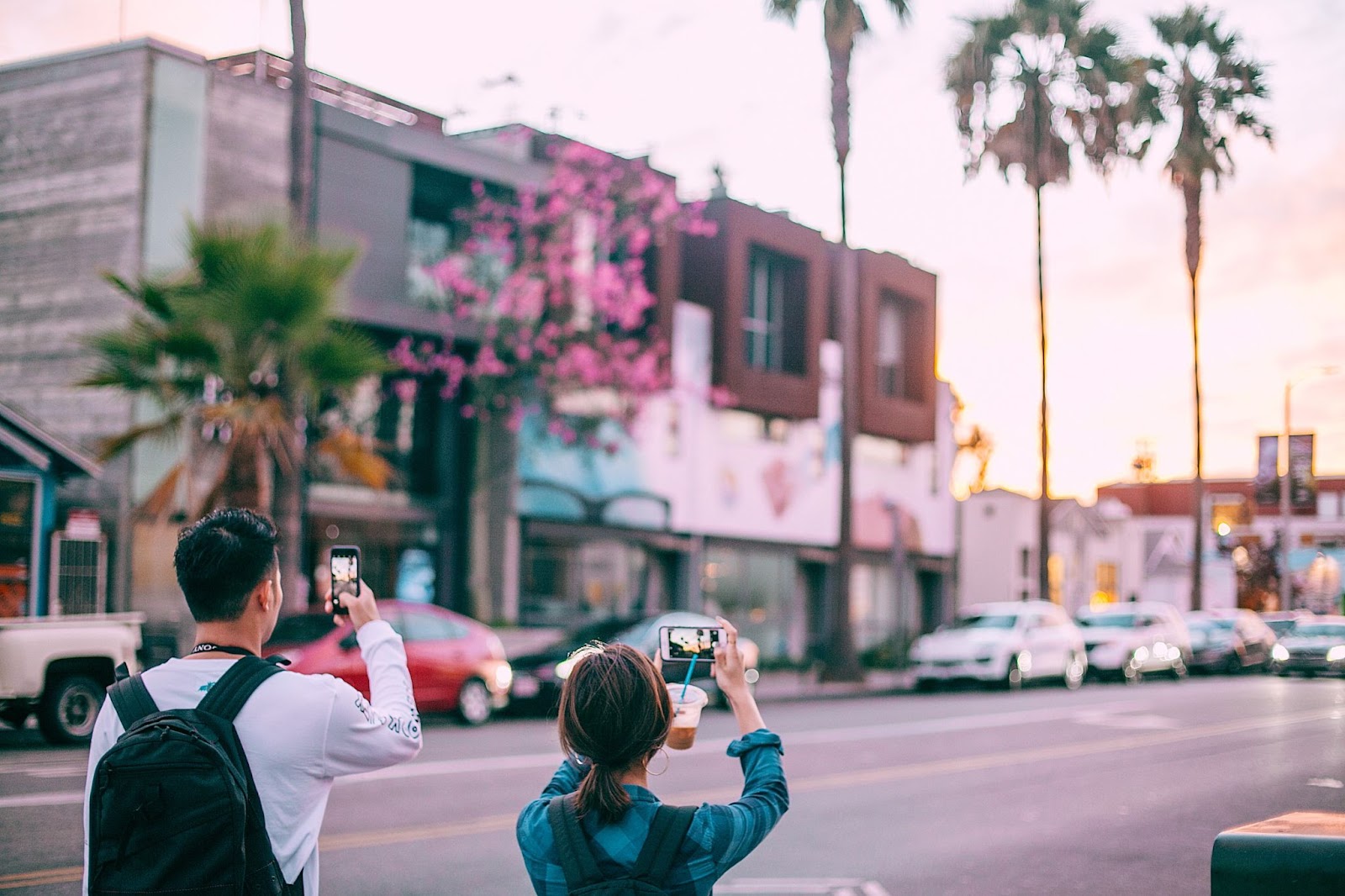English for travel – useful phrases and travel expressions in English
- English phrases for traveling – why you should learn English for travelers?
- English for travellers: The airport
- English for travellers: The airplane
- English for travellers: The train
- English for travel: Hotels and hostels
- English for travel: Asking about directions
- English for travel: Food and restaurants
- Travel English phrases: Shopping
- Travel English: Sightseeing
- Travel phrases in English: Emergencies / Health
- Useful English idioms for traveling
The holiday season is in full swing, so the only thing that you and your children think about is holidays, rest, relaxation by the water, in the mountains or in the allotment garden. Any form of outdoor entertainment that you offer to children will give them satisfaction, but when it comes to special holiday plans and trips, it is worth preparing something extra for the whole family.
In recent years, trips and excursions abroad have become extremely accessible, and what is more, competitively priced. For this reason, we more and more often decide to book a flight ticket for a flight abroad: to Croatia, Spain, Italy, Malta, Turkey or Greece. These are just a few of the most popular holiday destinations among the British people. You can also use the holiday time to visit European capitals, London, Paris, Prague or Copenhagen.
All these holiday trips have a common denominator – they require at least a basic knowledge of English so that both children and parents can communicate safely abroad. English phrases for travelling are useful to communicate in a shop or hotel, ask for directions, learn something about local attractions and monuments, or simply not to get lost at the airport in the maze of English-language information.
Knowledge of the English language in today’s world is really a necessity. Even 3 4-year-olds are learning English now, and many parents bravely follow in their footsteps. If you do not know English well, and your child is only on a beginner level – no problem! Here you will find useful travel English phrases that will come in handy when traveling.
All you need to do is master a few basic phrases, and you’ll be fine on your next family vacation abroad! English for travel and vacation is easy – try yourself! In this article you’ll find plenty of English travel terms and phrases.
English phrases for traveling - why you should learn English for travelers?
Learning travel phrases in English can open up a world of possibilities for both you and your children. Here are five compelling reasons why you should prioritize English language skills for your next travel experiences:
- Easy Communication: English is widely spoken across the globe, making it the go-to language for international communication. By learning English, you and your kids can confidently navigate through different countries, interact with locals, ask for directions, order food, and fully immerse yourselves in new cultures.
- Safety and Security: When traveling, it’s crucial to be able to express yourself and understand important safety instructions. Knowing English provides an added layer of security, allowing you to ask for help when needed, communicate with authorities, and ensure the well-being of your family in unfamiliar surroundings.
- Enhanced Cultural Experiences: Language is a gateway to culture. By learning English, your children can engage in meaningful conversations with locals, learn about traditions, and gain a deeper understanding of the places they visit. This enriching experience will create lasting memories and broaden their global perspective.
- Educational Opportunities: English is the language of academic excellence. By mastering English, your children can seize educational opportunities while traveling. They can attend summer schools, participate in language exchange programs, and even consider studying abroad in the future. Learning English opens doors to a world of educational possibilities.
- Independence and Confidence: As your children develop their English language skills, they become more independent and self-assured travelers. Being able to communicate in English empowers them to explore new destinations, interact with fellow travelers, and navigate transportation systems, fostering a sense of confidence and resilience.
Don’t miss out on the chance to equip your children with essential English language skills for their travel adventures. With the flexibility and convenience of an online English class for kids, such as the one offered by Novakid, your kids can continue learning throughout the summer from any location. All they need is a computer with internet access to participate in engaging lessons led by experienced, native-speaker teachers. Make this summer a time of growth and discovery for your children with the gift of English language proficiency with Novakid!
English for travellers: The airport
Here are some useful English phrases for travel at the airport or on the plane. It is good to know what is the meaning of popular airport signs, which you should pay attention to. You should also know and how to search for lost luggage in English, which, of course, we do not wish anyone!
Vocabulary:
- Departure: The act of leaving or the point of leaving from the airport.
- Arrival: The act of arriving or the point of arriving at the airport.
- Boarding pass: A document that allows you to board the airplane.
- Check-in: The process of registering and obtaining your boarding pass at the airport.
- Security check: The procedure of going through security screening before entering the departure area.
- Baggage claim: The area where you collect your checked-in luggage after arriving.
- Gate: The designated area where passengers board the aircraft.
- Customs: The area where your luggage may be inspected and you may have to declare items.
- Immigration: The process of clearing passport control to enter or exit a country.
- Duty-free: Shops that sell goods without taxes or duties.
- Delay: A situation in which a flight is postponed or held up.
- Terminal: The building at the airport where passengers board and disembark from flights.
- Announcement: A public statement made over the airport’s PA system.
- Baggage allowance: The maximum weight or number of bags allowed on a flight without extra charges.
- Security checkpoint: The area where passengers are screened for prohibited items before entering the departure area.
Expressions and phrases used at the airport
- Can you tell me where the check-in counter is?
- Excuse me, which gate is my flight departing from?
- Where can I find the baggage claim area?
- Is there a currency exchange desk in the airport?
- Could you please direct me to the nearest restroom?
- I need to declare some items at customs. Where should I go?
- Is there a designated smoking area in the airport?
- Can you recommend a good place to grab a quick bite to eat?
- What time should I arrive at the security checkpoint?
- Could you help me find a taxi or transportation to my hotel?
English for travellers: The airplane
English is also useful on the plane, when you want to find your place, ask the flight attendant for water, or when you want to be up-to-date with the messages displayed on the screen.
Vocabulary:
- Seat: The place where you sit during the flight.
- Seat belt: A safety device worn around the waist to secure passengers during takeoff, landing, or turbulence.
- Tray table: A small table that folds down from the seat in front of you.
- Overhead bin: Storage compartments above the seats for carry-on luggage.
- Cabin crew: The flight attendants responsible for passenger safety and comfort.
- Lavatory: The restroom facilities on board the airplane.
- Emergency exit: A designated door for evacuating the airplane in case of an emergency.
- Call button: A button to summon a flight attendant for assistance.
- In-flight entertainment: Entertainment options available on board, such as movies, music, or games.
- Beverage cart: A trolley that serves drinks and snacks during the flight.
- Window seat: A seat located next to the aircraft window.
- Aisle seat: A seat located on the side of the aircraft’s aisle.
- Oxygen mask: A mask that provides oxygen during an emergency situation.
- Seat recline: Adjusting the angle of the seat back for added comfort.
- Fasten seat belt sign: The illuminated sign indicating passengers should fasten their seat belts due to turbulence or approaching landing.
Expressions and phrases for traveling on the airplane
- Excuse me, is this seat taken?
- Can I have a blanket and pillow, please?
- How long is the flight expected to be?
- Do you have any vegetarian meal options available?
- May I have a glass of water, please?
- Could you assist me in stowing my carry-on luggage?
- Is there a power outlet or USB port near my seat?
- Are there any in-flight entertainment options on this flight?
- What is the current altitude and cruising speed of the aircraft?
- Excuse me, could you please lower the window shade?
English for travellers: The train
During summer vacation, many families travel by train to their destinations. Here are some common phrases, that may come in handy while travelling via rail.
Vocabulary:
- Train station: The location where trains arrive and depart.
- Platform: The raised area where passengers wait for trains.
- Ticket: A document that allows you to travel on the train.
- Ticket office: The place where you can purchase or collect your train tickets.
- Timetable: A schedule that shows the departure and arrival times of trains.
- Departure: The act of leaving or the scheduled time for a train to leave.
- Arrival: The act of arriving or the scheduled time for a train to arrive.
- Platform number: The assigned number indicating where your train will arrive or depart.
- Train carriages/cars: The individual sections of the train where passengers sit.
- Seat reservation: A pre-booked seat on a specific train.
- Luggage rack: The area above the seats where you can store your bags.
- Train conductor: The person who checks tickets and assists passengers on the train.
- Boarding: The act of getting on the train.
- Announcements: Public messages or announcements made at the train station.
- Connection: The transfer from one train to another at a specific station.
- Compartment: A separate area in a train carriage with a group of seats facing each other.
- Dining car: A designated carriage where passengers can purchase meals and drinks.
- Intercom: A communication system used for announcements or emergencies on the train.
- Ticket inspector: A person who checks tickets and ensures passengers have valid tickets.
- Platform sign: Signs indicating the platform number, train schedules, and destinations.
Expressions and phrases for traveling on a train
- What platform does the train to [destination] depart from?
- Excuse me, is this seat reserved?
- How long is the journey from here to [destination]?
- Does this train have Wi-Fi onboard?
- Is there a dining car or food service available on this train?
- Can you help me with my luggage?
- Are there power outlets on the train to charge electronic devices?
- Is there a restroom on board the train?
- Is there a designated quiet or silent zone on the train?
- Excuse me, what time is the next stop?
- Can I buy a ticket on board the train?
- Is there a conductor on the train who can assist me?
- Are there any stops or transfers along the route?
- How often do trains run on this route?
- Can I see the train schedule or timetable?
- My ticket is already paid.
- Is the internet connection working?
English for travel: Hotels and hostels
After arriving at the holiday destination, English will also be useful for checking in at the hotel, asking for the room number and its amenities.
Vocabulary:
- Reservation: The act of booking a room in advance.
- Reception: The front desk or area where you check in and out of the hotel or hostel.
- Check-in: The process of registering and receiving your room key or key card.
- Check-out: The process of settling your bill and returning your room key or key card.
- Room key: A card or key that grants you access to your room.
- Single room: A room with a single bed for one person.
- Double room: A room with a double bed for two people.
- Twin room: A room with two single beds for two people.
- Suite: A larger, more luxurious room with additional living or sleeping space.
- Amenities: The facilities and services available at the hotel or hostel, such as a gym, pool, or spa.
- Breakfast included: The provision of breakfast as part of the room rate.
- Wi-Fi: Wireless internet access provided in the hotel or hostel.
- Room service: The service of delivering food and beverages to your room.
- Housekeeping: The staff responsible for cleaning and maintaining the rooms.
- Late check-out: The option to stay in the room past the regular check-out time for an additional fee.
- Key card: A card with a magnetic strip or chip used to access your room.
- Reservation number: The unique identifier for your booking.
- Front desk: The area at the reception where guests are attended to.
- Bellboy/Porter: A staff member who assists with luggage and escorts guests to their rooms.
- Invoice/Bill: A document detailing the charges for your stay, including room rate and any additional services.
Expressions and phrases for stayin in hotels / hostels
- Do you have any available rooms for tonight?
- How much is a room for one night?
- Can I see the room before I make a decision?
- Is breakfast included in the room rate?
- What time is check-in and check-out?
- Could you please bring extra towels to my room?
- Is there free Wi-Fi available in the rooms?
- Can you recommend any good restaurants nearby?
- Could you arrange a taxi for me tomorrow morning?
- Is there a safe deposit box where I can store my valuables?
- Can I have a wake-up call at [desired time] tomorrow?
- I’m having trouble with the air conditioning/heating in my room. Can you assist?
- Are there any laundry facilities or services available?
- Is there a gym or fitness center in the hotel/hostel?
- Could you please provide a map of the local area?

English for travel: Asking about directions
When you reach your holiday destination, you can start blissful relaxation or intensive sightseeing – it depends on your preferences and the will of your children. In each of the vacation situations, however, a few basic phrases will be useful. This will make it easier to navigate around a new place, ask local residents for specific information or find interesting attractions.
Vocabulary:
- Excuse me: A polite phrase used to get someone’s attention.
- Can you help me?: A question asking for assistance or directions.
- Where is…?: A question asking for the location of a specific place.
- How do I get to…?: A question asking for directions to a specific destination.
- Go straight: Proceed in a direct or linear path without turning.
- Turn left: Change direction by moving to the left.
- Turn right: Change direction by moving to the right.
- Cross the street: Move from one side of the road to the other.
- It’s on the left/right: Indicating that the destination is located to the left or right side.
- Is it far? Is it close?: Questions to inquire about the distance of the destination.
- Is there a bus/train station nearby?: Inquiring about the proximity of public transportation.
- Can you show it on the map?: Asking someone to mark or indicate the location on a map.
- Excuse me, I’m lost: Informing someone that you are unable to find your way.
- Landmark: A prominent or recognizable feature used as a point of reference.
- Can you repeat that, please?: Asking someone to repeat or clarify the directions given.
Expressions and phrases you need to know to get to your destination
- Excuse me, could you tell me how to get to [destination]?
- Can you please give me directions to [location]?
- Which way is [landmark]?
- I’m a bit lost. Can you help me find my way back to [point of reference]?
- Is it far from here?
- Could you point me in the right direction for [place]?
- Can you recommend the quickest route to [destination]?
- Is there a bus/train station nearby?
- How long does it take to walk/drive to [location] from here?
- Excuse me, but I seem to have taken a wrong turn. How can I get back on track?
English for travel: Food and restaurants
Getting to know the local culture and culinary delicacies is also an essential element of holidays abroad. On holidays, we often eat in restaurants, go out for ice cream with the children or buy souvenirs. In all these situations, in a restaurant or in a store, you will also need a handful of English words and phrases, which will help you get along with the waiter or seller.
Vocabulary:
- Menu: A list of food and beverage options available at a restaurant.
- Appetizer/Starter: A small dish served before the main course.
- Main course/Entrée: The primary dish of a meal, typically larger than an appetizer.
- Dessert: A sweet dish or course served at the end of a meal.
- Beverage/Drink: A liquid consumed with a meal, such as water, soda, juice, or wine.
- Vegetarian: A person who does not eat meat. Vegetarian dishes are prepared without meat.
- Vegan: A person who does not consume any animal products. Vegan dishes are free from meat, dairy, eggs, and other animal-derived ingredients.
- Special of the day: A dish or menu item that is unique or highlighted for that particular day.
- Reservation: The act of booking a table at a restaurant in advance.
- Waiter/Waitress: A server who takes orders and serves food and beverages at a restaurant.
- Chef: The professional cook responsible for preparing and overseeing the kitchen.
- Bill/Check: The statement of charges for the meal that needs to be paid.
- Tip/Gratuity: An additional amount of money given to the server as appreciation for good service.
- To-go/Takeaway: Food ordered to be packaged and taken away instead of dining in the restaurant.
- Table for [number]: Requesting a table for a specific number of people.
- Gluten-free: Food items that do not contain gluten, a protein found in wheat, barley, and rye.
- Condiments: Sauces, dressings, or spices used to enhance the flavor of food.
- Allergies: Dietary restrictions or adverse reactions to specific ingredients.
- Non-alcoholic: Beverages that do not contain alcohol.
- Self-service/Buffet: A style of dining where customers serve themselves from a selection of food.
Travel expressions to use at the restaurant
- Could we have a table for [number] people, please?
- What do you recommend from the menu?
- Is the [dish] spicy/mild?
- Can I see the wine/beer list, please?
- Are there any vegetarian/vegan options available?
- Can I have the bill/check, please?
- Is service included in the bill/check?
- Can we split the bill/check, please?
- Excuse me, could I get some extra napkins, please?
- I’d like to order the [dish], please.
- Could I have a glass of water, please?
- Can I make a reservation for [time] tonight?
- Is it possible to customize the [dish] to my dietary preferences?
- What are the daily specials or chef’s recommendations?
- Excuse me, I have a food allergy. Can you accommodate special dietary needs?
Travel English phrases: Shopping
While travelling, we often see colorful souvenir shops around every corner. Buing souvenirs from travels is something families with kids often do. Let’s find out how to buy a souvenir in English and how to communicate with shop owner.
Vocabulary:
- Grocery store/Supermarket: A large retail store where you can purchase food and household items.
- Shopping cart/Trolley: A wheeled basket used for carrying items while shopping.
- Aisle: A pathway between shelves or displays in a store.
- Brand: A specific company or manufacturer of a product.
- Price: The cost of a product or item.
- Sale: A discounted price or special promotion on a product.
- Cashier/Till: The person or area where you pay for your purchases.
- Receipt: A document that serves as proof of purchase and itemizes your purchases.
- Cash: Physical money used for making purchases.
- Credit card/Debit card: Plastic cards used for making electronic payments.
- Discount: A reduction in price for a product or item.
- Checkout: The area or process of paying for your purchases.
- Shopping bag: A bag provided by the store to carry your purchases.
- Souvenir shop/Gift shop: A store that sells mementos and unique items related to a specific location or event.
- Souvenir: An item purchased to remember a place or experience.
- Local specialty: A product or food item that is unique to a particular region.
- Size: The measurement or dimensions of a product, particularly for clothing or shoes.
- Shelf: A flat surface where products are displayed and stored in a store.
- Salesperson/Shop assistant: An employee who assists customers and provides information in a store.
Travel questions you might need to ask while shopping
- How much does this cost?
- Do you have this in a different size/color?
- Is there a discount on this item?
- Can I try this on, please?
- Do you accept credit cards?
- Could you gift-wrap this for me?
- Is there a return/exchange policy?
- Can I get a receipt, please?
- Do you have any other similar items?
- Is there a warranty for this product?
- Can I see some more options in that category?
- What material is this made of?
- Can I get a discount if I buy multiple items?
- Are there any sales or promotions happening?
- Do you offer international shipping?
- Do you accept foreign currency?
Travel English: Sightseeing
Here are some other useful phrases to help you communicate in English during sightseeing in an English speaking country.
Vocabulary:
- Tourist attraction: A popular place or site that is visited by tourists.
- Landmark: A well-known feature or structure that is easily recognizable and often of historical or cultural significance.
- Guidebook: A book or publication that provides information about tourist attractions, maps, and recommendations.
- Map: A visual representation of an area, showing roads, landmarks, and points of interest.
- Tour: A guided visit or journey to explore and learn about a place or attraction.
- Sightseeing: The activity of visiting and observing interesting places and attractions.
- Museum: A place that exhibits collections of historical, artistic, or cultural artifacts for public viewing.
- Gallery: An establishment that displays and sells works of art.
- Monument: A structure or statue built to commemorate a person, event, or historical significance.
- Cathedral: A large and important church, usually the seat of a bishop.
- Historical site: A place that holds historical significance and provides insights into the past.
- Architecture: The art and science of designing and constructing buildings.
- Sculpture: Three-dimensional artwork created by carving, molding, or casting.
- Plaza/Square: An open public space in a city, often surrounded by buildings and used for gatherings or events.
- Fountain: A decorative structure that releases water into a basin or jets it into the air.
Useful English expressions for sightseeing
- Can you recommend any must-see attractions in this city?
- How do I get to [landmark/attraction] from here?
- Is there a guided tour available for [landmark]?
- What time does [museum/attraction] open/close?
- Are there any entrance fees for [landmark/attraction]?
- Can you provide a map or brochure of the local sights?
- Is photography allowed inside [museum/attraction]?
- Are there any discounts available for students/seniors?
- Is there an audio guide or guided tour available in English?
- Can you tell me a bit about the history of this [monument/landmark]?
- Are there any nearby viewpoints for panoramic views of the city?
- Are there any specific guidelines or restrictions for visiting [attraction]?
- Can you recommend any good walking routes or scenic trails in the area?
- Is it possible to book tickets for [attraction] in advance?
- Are there any special events or exhibitions happening at [museum/attraction]?
Travel phrases in English: Emergencies / Health
We do not wish anyone any problems with health or emergencies during their vacation, but once they happen, it’s good to know some English phrases useful during communication with doctors or other authorities.
Vocabulary:
- Emergency: A serious or unexpected situation requiring immediate action.
- Help/Assistance: Requesting aid or support in a difficult situation.
- Hospital: A medical facility where people receive treatment for illnesses and injuries.
- Doctor/Physician: A medical professional who diagnoses and treats illnesses and injuries.
- Ambulance: A vehicle equipped for transporting people who are ill or injured to the hospital.
- Injury: Physical harm or damage to the body.
- Illness/Sickness: A state of poor health or a specific medical condition.
- First Aid: Initial medical treatment provided to an injured or ill person before professional medical help arrives.
- Medication: Prescribed or over-the-counter drugs used for treating or preventing illnesses.
- Allergy: A negative reaction of the body’s immune system to a specific substance.
- Pain: Unpleasant physical sensation or discomfort.
- Emergency contact: A person to be notified in case of an emergency.
- Insurance: Coverage that provides financial protection in case of unexpected events, including health emergencies.
- Pharmacy/Drugstore: A store where medications and medical supplies are sold.
- CPR (Cardiopulmonary Resuscitation): A life-saving technique used to revive a person whose heart has stopped beating.
Useful English expressions for emergency situations and at the hospital
- Help! There’s an emergency!
- Call an ambulance, please!
- I need urgent medical attention.
- Is there a hospital/clinic nearby?
- I’ve been injured. Can you please get me some help?
- I’m feeling unwell. Is there a doctor available?
- Where is the nearest pharmacy?
- I’ve lost my medication. Can you help me replace it?
- Is there an emergency contact I can reach out to?
- I need to go to the emergency room immediately.
- I’m allergic to [specific substance]. Please be cautious.
- I’m feeling dizzy/nauseous. Can you provide any assistance?
- Can you please notify my family/friends about the situation?
- I’ve been involved in an accident. Is there someone who can assist with the paperwork?
- Is there a translator available? I don’t speak English fluently.
- Where I’ll be able to get help?
Useful English idioms for traveling
- Hit the road: To begin a journey or start traveling.
- On the go: Constantly moving or traveling from one place to another.
- Catch some rays: To sunbathe or enjoy the sunshine.
- Break the ice: To initiate or start a conversation with strangers or in a new environment.
- Off the beaten path: Away from the usual tourist routes or popular destinations.
- Take a rain check: To postpone or reschedule a planned activity or event.
- Travel light: To pack only essential items and avoid carrying excessive luggage.
- Get lost: To explore without a specific destination in mind or to become disoriented in a new place.
- Breathe-taking view: An extremely beautiful or stunning sight.
- Itchy feet: A strong desire to travel or move from one place to another.
- Jet lag: The fatigue and disorientation experienced after traveling across different time zones.
- Home away from home: A place where you feel comfortable and at ease, as if it were your own home.
- Go the extra mile: To make additional effort or go beyond what is expected.
- Live out of a suitcase: To constantly travel or move around, often with limited possessions.
- Have a whale of a time: To have a great or enjoyable experience.
As you can see, memorizing useful phrases for travelling in English is not so complicated. We hope, that with all the examples, you’ll be able to travel comfortably on your next family vacation. Remember to encourage your kids to speak English on vacation abroad as much as possible, since it’s always best to practice English travelling phrases and other vocabulary in real life situations. Now you shouldn’t be afraid to ask questions regarding directions in English, ask about your hotel stay and check out from which platform your bus or train departures. Transportation, attractions and getting around in any English-speaking country and other EU countries will be much easier now!
Did you find this article helpful?
















































Good information for travelling, It is interesting. Thanks so much!
Well done. I found it very useful and in fact I was rather impressed to find a website with complete different vocabularies and expressions for all traveling necessities one could think of.
Thanks very much.
Thanks for this wonderful article. It is so very helpful!
Fantastic lesson. thank you.